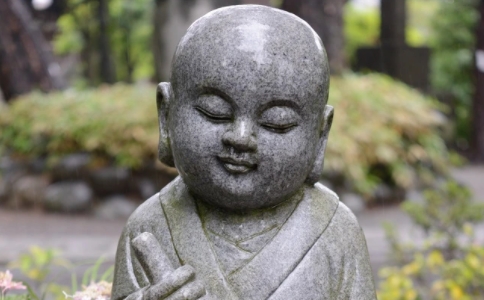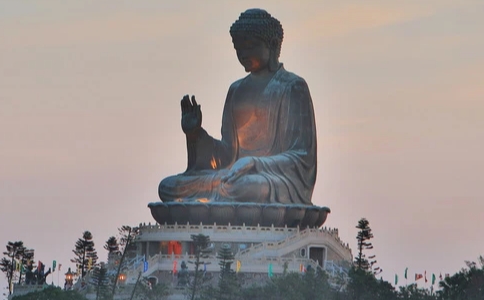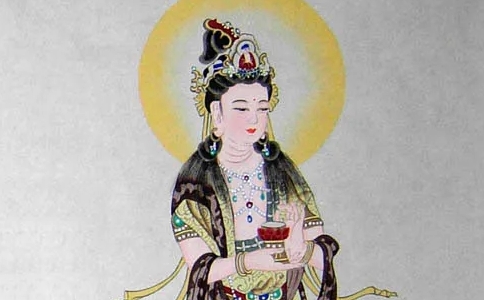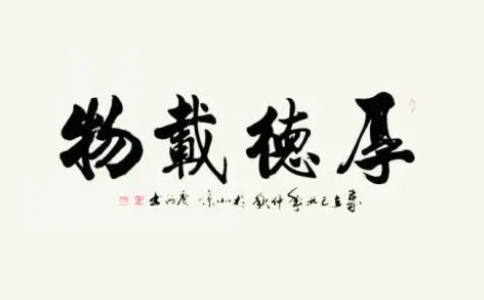
领悟佛道,首先就是领悟般若,切入佛道,首先就要从切入实相般若开始。这和学历没关系,和你的地位高低没关系,和你拥有多少荣誉没关系,和你的长相也没有关系,和你是男人还是女人没关系。你要经常的去找到这样的感受。这样我们的心才会清净,才会远离烦恼。这是修行。
To comprehend Buddha-Dharma, we need to understand Prajna first; To practice Buddha-Dharma, we need to start with the practice of Prajna mindfulness.It has nothing to do with our academic achievements, social status or the honors we have earned, neither does it have anything to do with our looks or genders. What we need to do is to search for our inner feelings of a still and clear mind, free from all worries and vexations.
在这样的前提下,才有可能去领悟般若。如果非常烦恼:“我连坐也坐不住”。那没办法,磕头去。什么时候折腾的没啥兴致了,把以前的那些和自己有关系的烦恼事慢慢的断尽了,这时候心才能清净。
Only in this way are we in the right path of Baddha-Dharma practice. Only by doing this can we comprehend what Prajna is. If we are in great vexation and can’t even sit quietly, we may try Kowtows or some other physical ways in front of Buddha statues. After we have tired ourselves out by doing so, we may forget all our worries and vexations. By this time, we may calm ourselves down and keep a clear and still mind.
其实,我们很多修行中的加行,都是这些方面的。还有一些,是关于生起信心:从不信到信。有的人开始是不信佛的,后来信了;开始的信是迷信,后来开始追求自己的成就;开始是寻求升官发财、多子多孙、以后的福报等等,后来逐渐的认识改变了,发起信心,自己修行。
In fact, many of the preliminary Buddhist practices have the same functions with kowtows while some others are for enhancing confidence in Buddha. Many people didn’t believe in Buddha, but gradually gain more and more confidence in Buddha by doing the preliminary practices; Others may start with superstition, but end with the pursuits of self-enlightenment and self-achievement; Still others may start to believe in Buddha for the achievement in a higher social status, bigger wealth, or a prosperous family and offspring, gradually however, they change their mind and begin to tread the path of Buddha-Dharma practice.
所以总体来说,佛法有两个方面:一个方面是发心,一个方面是智慧。所谓发心方面,要发大悲心、发决定成佛的心。有一个自己决定成佛的心,再加上一个大悲心,就会形成一个菩提心。
In general, there are two aspects in Buddhism: one is to make Vows and wishes, and the other is to achieve Buddha wisdom. As for making vows and wishes, we should strengthen our minds with infinite compassion and loving-kindness, and make a wish to achieve Buddhahood. The infinite compassion for all sentient beings and the wish to achieve Buddhahood together form the Bodhicitta.
那么,我们想成佛,想帮助众生成就佛道,我们自己得先会成。你先走,走一遍看看。你都没走,你怎么能告诉别人怎么走呢?所以我们自己还要去走这个菩萨道。这个道是怎么走呢?般若!
As long as we wish to become a Buddha and help all sentient beings to achieve Buddhahood, we ourselves must tread on the right path first. If we ourselves don’t know what the right way is, how can we show others the right way to achieve Buddhahood? Therefore, we ourselves must first accomplish this great mission as a bodhisattva. What is the right Bodhisattva Path? Prajna!
所以我们今天这个课程,原打算是从心经开始,但是头两天我觉得有必要先给大家讲:众生为什么轮回了?我们又应该怎样脱离轮回,走向解脱、走向成就?这样也为我们未来的学习铺一下路。
Originally, this class was planned to preach the teaching and practice of Heart Sutra, but now I realize the necessity of a preparatory class: how are we attached to Samsara, the cycle of reincarnation, and how can we get out of Samsara. In this way, a solid foundation of basic knowledge can be made for our future study.
众生是怎么轮回的?什么原因导致的轮回?轮回的众生,如何从轮回痛苦、烦恼中解脱出来,超越轮回,乃至走向究竟成就?我们自己想解脱,我们自己想成就,我们就要知道我们错在哪儿,我们到底怎么了。这个事情要从我们众生的特点说起。
How are the sentient beings attached to Samsara? What’s the reason for Samsara, the cycle of reincarnation? How can the sentient beings be liberated from the cycle of pains and vexations, transcend Samsara and achieve the ultimate Buddha wisdom. As long as we wish to liberate ourselves and achieve ultimate enlightenment, we must, first of all, be clear about what’s wrong with us. To make this point clear, let’s start with the characteristic of the sentient beings.
众生有什么特点呢?佛陀称之为无明。无明是众生轮回的根。什么叫无明呢?无明还有几个名字:愚痴、迷失、愚迷。众生因为无明、因为愚、因为迷失了,所以不知道正确的道路,不知道生命正确的状态,不知道如何正确的对待自己、对待别人。并且坚持他认为正确的东西。
What characteristic do all sentient beings possess? The Buddha calls it Avidya. Avidya is the root of reincarnation,which can also be called stupidity,confused perplexity or ignorance. Because of Avidya, the sentient beings are at a loss of what the right way is and what the right state of life is. We don’t know how to treat both ourselves and others wisely.
凡是迷的人,他都有他的一些想法,否则他没迷。他的这个想法越坚固,就越难于成就,越难于找到那个明,找到正确的生命之路。所以称为迷、称为愚,这叫做无明。详细解释一下无明。无明包括这样两个方面:
Some of us are so lost and confused that they stubbornly believe in the knowledge and conceptions they have acquired and are firmly attached to their own thoughts and ideas. As a result, the more they are lost, the more stubborn they become and the harder it is for them to find the right way to achieve ultimate enlightenment. This is the so-called Avidya, which includes two aspects:
第一个方面,是对生命的规律不懂。我们自己是一个生命,但是对生命不了解。我们这个生命是按照一个怎样的规律向前走的呢?自己不清楚,不了解生命规律。
One aspect of Avidya is the ignorance about the law of life. We ourselves are a kind of life, nevertheless we know so little about life. We have no idea about the law of life and how we progress.
那么生命的规律是什么?因果轮回,这是它主要的一个规律。如果我们懂得了这个规律,那么我们就不会把自己推到一个很苦的状态之中。不知道因果规律:行善法,得善果;行恶法,得恶果;
What’s the law of life? The law of cause and effect is the main law of life, which means kind deeds lead to happy results while bad deeds result in evil result. If we understand and believe in it, we shall not force ourselves into a miserable state of life.
第二点就是,对生命的本性不清楚,这个也包括物质世界。这个宇宙的本性是什么?不清楚。那么宇宙本性是什么呢?本性是空。单纯的对我们生命来说,叫佛性,也叫一真法界、如来藏,都是指的它。一般的从现象界的角度讲,就直接说空,而从我们这个生命的角度来说,称作佛性。
The other aspect of Avidya is the ignorance about the nature of life, including the nature of the material universe. What’s the nature of the life and the universe? Sunyata---Emptiness. It has different names in Buddhism: the Buddha nature, the One-True Dharma Realm or Tathagatagarbha; From the angle of the material world, we simply call it emptiness, while from the angle of life, it is called the Buddha nature.
我们每个人都有佛性。我们的佛性广大无边,充满整个宇宙。而且,我们每个人的佛性,和佛陀的佛性、和一切十方三世一切诸佛的佛性是一样的,甚至也可以说是无二无别的。这样更准确:无二无别,本来是一,没有二。
All sentient beings have the Buddha nature, which is boundless and endless, spreading all over the time and space. What’s more, everyone’s Buddha nature is exactly the same with all past, present and futures Buddhas. There is absolutely no difference, as it is basically one, not two.
但是,我们所谓的迷失了,就是对这些东西不懂了。为什么会不懂了呢?源于我们对外部现象界的追求、执着。我们执着于我、法,我执、法执。这个法就是,我们所能想到的、见到的、听到的、说到的,一切的现象都属于法,其实也包括这个我。但是,一般都因为这个我更重要,所以把它单独提出来。
However, we are lost and don’t know our Buddha nature any more, simply because of our stubborn delusion and desire for the outside world and because of our persistence in the existent self and our attachment to dharma. Dharma includes all that we can see, hear, feel, think of and speak about. Virtually, Dharma also includes the self, but the self is habitually taken more seriously and importantly, therefore, it is separately listed from the dharma.
因为这两个执着,我们就会时时刻刻看着眼前所遇到的各种法:“它对我有好处还是有坏处?我应该怎么对付他?应该怎么去对治?怎么去做?是要还是排斥?” 这中间就有一个抉择、取舍的过程。这个过程包括什么呢?一个是贪:很重要的,抓取。
Because of our attachment to the self and to the dharma, we accept all the dharma (the phenomena) on the basis of the self,“Is it good or bad for me? How shall I deal with him? What shall I do, to accept or to reject?” There is always a choice to make. This process is mainly composed of two things: greediness and ill-will.
看到了什么,就要抓取;很新鲜的,要去研究。这就是抓取的心,属于贪。贪的过程,又强化了对我的执着,对于法的执着。贪所造的业是什么业呢?贪所造的业不是善业。什么是善业?利他为善。贪,没有给自己,至少也得给自己的朋友、自己的家、自己的单位等等,这都是贪, 或者是一个抓取的心。它造的业是什么业呀?恶业。
Seeing something good, we shall try to grasp; seeing something new, we shall try to study. This is our grasping hear, our greediness, which in turn strengthens our attachment to the self and dharma. What karma does greediness create, positive or negative? Kind karma is based on selflessness and altruism, while greediness is totally based on the self: do everything for me, or at least for my relatives and friends. As a result, greediness creates negative karma.
贪不着,或者对自己是一个伤害的东西来了,那么我们就会怎样呢?就会嗔,嗔怒的心就来了,甚至也包括嫉妒。你要得到了,你肯定不嫉妒。什么你都得到的时候,你嫉妒谁呀?光剩别人嫉妒你了!不如意、嫉妒心所造的业,是什么业呢?还是恶业!嗔恨心所造的业,一般至少是心里有恨,甚至行为上有伤害,语言上有伤害:埋怨、牢骚等等,都是恶的。
When we don’t get what we try to grasp, or when there is something harmful coming, what’s our response? We shall become ill-willed, either be resentful or jealous, simply because we can’t get what we desire. What’s the result of ill-will? Definitely negative karma, since resentment and jealousy are negative mental activity, leading to more harmful behavior or aggressive speech such as complaints or curses.
我们对外界的现象除了贪和嗔,还有什么选择?你只要去动念、动心了,就是贪和嗔两个选择。那么所造的业就是恶业。所以佛陀说南阎浮提众生,起心动念无不是恶、无不是业!众生的心就是这样一个愚迷的心。他们的行为、做事,做一个总结就是:无不是罪,无不是业。所以,最后的结果是什么?堕落、下滑、三途苦、苦果。种下了苦的因,得到了苦的果。
Greediness and ill-will are the two main choices when we face the outside world. As long as we have any thoughts or intentions, we face the two choices, either greediness or ill-will, both leading to negative karma. Just as the Buddha said: All the sentient beings in Jambu-dvipa (the world we are living) create negative karma as long as they have any thoughts or intentions. Consequently, we degenerate, fall down to the Three Evil Paths of reincarnation and suffer intensely and endlessly.
当你得到苦果时候怎么样?又是不如意,又发现别人都能得到的东西我没有,别人都很顺利就我不顺利,别人坏事儿都少一点儿,我怎么就这么多坏事。苦呀!进一步就更加产生贪心、嗔心,加倍的贪和嗔,在苦上种更大的苦因苦果!然后进一步的贪、嗔,这其实就是简单的十二因缘。浓缩一下:这样一个不断的缘生缘灭,缘生与缘灭。
What happens when we taste the bitter fruit of our negative karma? More bitterness and sufferings follow. We may find others are happier, wealthier and more successful, while we suffer more and are more miserable. As a result, our greediness and ill-will will increase and expand, thus planting more bitter fruit. This is the simplified Twelve Nidanas(the twelve-linked causal formula), performing the constant cycle of cause and effect, the cycle of reincarnation
但是它的根源在哪儿呢?根源在于无明,或者说,根源在于我执、法执。这样就造恶因、得恶果,不断的造恶因、不断的得恶果。最后我们就只好成为轮回众生。我们都是怎么活着?在苦果上面,不得已而活着。在这些不得已中,有一些事情我们可以接受。为什么可以接受呢?因为别人都接受了,这个事儿就天经地义了。
All these originate from Avidya, our ignorance of the dharma, or in other words, the attachment to the self and the dharma. Because of this attachment, negative karma is created, hence all the miseries and sufferings, which lead us into Samsara, the cycle of reincarnation. We all have to live on negative karma and endure all the miseries and sufferings as soon as we were born into this world. We accept all the miseries and sufferings as they are simply because everyone else takes it for granted that this is what life should be like.
比方说:我们每一个人,都有一个身体。有身体本身就是苦。沉不沉呐?每个人一百来斤,你什么时候都要带着。所以大家听课,还要有个座,因为很辛苦。一百来年,带了一百来斤,但是我们发现别人也带着,那这个事儿就得受吧。你没有这儿一百来斤,你还用走路吗?那多么的轻盈呐!轻盈到比那个鹅毛还轻,鹅毛还有分量呢!但我们不行。我们从这儿走到霞浦县城,再想走回来,就有点吃不住了。
Take our body for example. Our body is the result of negative karma, since we have to carry it everywhere even though it is heavy and inconvenient. We need a seat, because we easily feel tired to attend the class with a body of over 50 kilos. It may tire us out to walk from the downtown to the monastery. Tiring and inconvenient as it is, we accept it easily for the simple reason that all others are enduring. How light and graceful it would be without our heavy and clumsy body. We would feel lighter than a feather and would be able to fly to anywhere we like.
为什么呢?你有恶果在身,身体是属于罪报。但有的人比较一下,觉得我这个身体还是蛮不错的嘛:身高两米二五,长相非常潇洒!比较一下还可以。也有的人每天就要去买各种的化妆品,先把暴露在外面的,把它整的像模像样,自己没有特别的感觉,但是得让别人认为自己挺好。还有穿衣服,不穿衣服其实更舒服一点,但是不行呢,冷!冷怎么办?就得往上穿。这个很麻烦。你出生的时候,穿一次还不行,每天都在穿。这都是属于恶报。
We have to endure our clumsy body because of our evil karma. Some may feel rather good about his body---- 2.25 meters tall, cool and handsome; some others try every means to make their body neat and decent by using various kinds of cosmetics in order to feast others’eyes. We need clothes to cover our body day by day, and year by year, no matter how troublesome it is. All these belong to evil karma.

佛教团体,最重纪律。受了戒的人,习过威仪,自然动作合礼;普通学人,何能懂得,不免招惹讥笑。特为写出几条通常规矩来,作个参考。(一)入寺,入寺门后,不宜中央直行,进退俱当顺着个人的左臂迤边行走。入殿门里,帽及手杖须自提携,或寄放他室为佳,万不可向佛案及佛座上安放。

一般人不了解佛教所说的「空」,以为佛教所说的「空」是什么都没有的空,这可说是误解了空的真义。宇宙「缘起」的现象是:「诸法因缘生,诸法因缘灭。」诸法因为因缘的和合而生,因缘的消散而灭,所以其本性为空。即世间上的形形色色,皆由于因缘和合而成,并没有实在的自体,故称为「空」。常人对空的了解,往往止于什么都没有的「顽空」;说到有,则认为是什么都有的「实有」。其实,佛法所说的「有」,是如幻的缘起假有,虽有而不碍其空;佛法所说的「空」,是无实的自性本空,虽空而不碍其有。此即缘起性空的道理。

回向偈一,愿以此功德。庄严佛净土。上报四重恩。下济三途苦。若有见闻者。悉发菩提心。尽此一报身。同生极乐国。回向偈二,愿生西方净土中,九品莲花为父母。花开见佛悟无生,不退菩萨为伴侣。回向偈三,大慈菩萨回向偈十方三世佛,阿弥陀第一;品度众生,威德无穷极。

虽然信仰佛教的人越来越多,但是其实有很多烧香拜佛的人,他们的动机并不如法。三年前曾经有一位居士对我说,某一个庙门口,有一位老太太手里拿着高香,祈祷佛菩萨说:“观音菩萨呀、佛菩萨呀,我的儿媳妇对我不好,让她早早受到惩罚吧!”这哪里是在学佛呀?明明是害人,太可怕了!这种东西简直是离佛教千里之遥。还有这样说的:“神佛呀,让我赚多少多少钱吧,我拿着多少多少钱来给你烧高香……”这些是要佛菩萨替你出气、合伙做生意。

观音菩萨的六字真言,又叫六字大明神咒——唵嘛呢叭咪吽。此神咒为观音菩萨的心咒,具有多重且深广的意义与功德,普为一般佛教徒所诵持。一说唵嘛呢叭咪吽就是“皈依莲华上之摩尼珠”的意思,为西藏佛教徒向莲华手菩萨祈求未来往生极乐时所唱的咒语。

许愿是佛教发愿思想的一种民间表现形式。在茫茫人海中,个人的力量非常渺小。通过向佛菩萨许愿,祈望得到加持保佑,增强人生信念。多数人许愿,是为亲朋好友的健康平安、工作顺利和儿女的学业有成。这样美好的人生愿望,被一些人错误理解为向佛菩萨贿赂。偏见实在令人无语。

什么是业障?业障,指妨碍修行正果的罪业。谓众生于身、口、意所造作之恶业能蔽障正道,故称业障。业是造作,佛在经上把它区分为三种,身、语、意叫三业。我们身体的动作是身业,包括的范围非常广,肢体动作是业,我们肢体不动作的时候,还在造业,造的什么业?

《八十八佛大忏悔文》全文,大慈大悲愍众生,大喜大舍济含识; 相好光明以自严,众等至心归命礼。(一拜)南无归依十方尽虚空界一切诸佛。(一拜)南无归依十方尽虚空界一切尊法。(一拜)南无归依十方尽虚空界一切贤圣僧。(一拜)

佛,在佛教里是指佛陀,是释迦牟尼的简称。释迦牟尼是一个平平凡凡的人,他在廿九岁那年舍弃了即将可以继承的王位,出家学道,寻求解脱人生苦恼的方法。六年后,也就是卅五岁的时候,释迦牟尼在尼连禅河旁的菩提树下证得了正觉,正确而透彻地觉悟了宇宙人生的根本道理。 释迦牟尼同我们一样都是平凡的人,他能够藉修行而悟道,所有千千万万的人类也都可以群起仿效,依照他所垂示的教法修行而证果。他祗是人类无数的先知先觉之一

印良法师,1974年出生于天津市,法号“天几”,字号“印良”,别号“岚山斋主”。天津乐善妙觉院住持,武夷山乐善福安寺住持,现代梵呗佛教音乐人。医易世家世袭祖德,自幼参学儒释道文化,研习禅、律、净、密四宗佛学,垂髫皈依,而立武夷山天心永乐禅寺披剃,太姥山平兴寺律坛得戒。常年历行佛学及传统文化推广,孜孜不倦示德身行。势承如来家业,发愿利乐有情。

在社会上,确实有很多贡高我慢之人。有一点点学问的人,就认为自命不凡。其实学问多了又怎么样呢?徒增分别念而已。有一些人长得漂亮,就目空无人,其实你长得再美,青春都会老去。有些人,有钱有势就盛气凌人,其实这只是今天的努力。有些人哪怕是出家了,也很傲慢

我们人有两个方向可以选择,一个选择向善向上,就是走向光明;一种就是走向堕落。我们每一个人都希望自己的生命是增上的,要往上走。所以我们就要找到一些方法来让我们的生命往上走。佛教把引导我们生命往上走的第一个基础就讲到五戒,五戒是通往人天的护照。如

佛教以人的认识为中心,对世界一切现象分为根、尘、识三大类根,合称十八界,包括能发生认识功能的六根(眼根界、耳根界、鼻根界、舌根界、身根界、意根界),作为认识对象的六境(色尘界、声尘界、香尘界、味尘界、触尘界、法尘界),和由此生起的六识(眼识界、

什么是幽冥菩萨戒?“幽冥菩萨戒”是在世人给过世亲人、祖先、冤亲债主等一切亡者,及孤魂所受持的菩萨戒律。由于他们生前曾造作恶业,现在堕落在恶道中受苦无尽,如果没有阳上亲人代他们超度,并受持菩萨戒律,就会永无出离之期。所以,受持幽冥菩萨戒就是阳上亲

弟子问:顶礼法师!请问法师第七识是什么?把阿弥陀佛名号和第七识绑在一起,是什么意思?一如法师解答:这个问题第七识是末那识,是什么识呢?他是一种我执的根本,就是我们凡夫众生生死的根本就是坚固的我执,但是坚固我执的根本原因就是第七木那识……

最初,梁武帝并不信仰佛教,但是当他登上了王位以后,他就改奉佛教了。当时,他下旨“舍道事佛”,并且要求群臣百官都“返伪就真,舍邪入真”。梁武帝推崇佛教可谓是不遗余力,在他的倡议下,佛教很快就进入了繁盛时期。在南朝时期,全国的寺院、僧尼数量也迅速增加起来,仅建康这个地方,就有五百多座寺院,十多万僧人。

在中国历史上,法显是第一位前往印度巡礼佛迹,求取经律,并且获得了巨大成就的中国僧人。东晋隆安三年(公元399年),他从长安出发,向西前行到达了巴连弗邑,他在这里停留了三年,求得了大量的经律论梵本,包括《萨婆多部律抄》、《摩诃僧只阿毗昙》等,后来,他又将这些经本传到了斯里兰卡。

简单地说,修行就是按照佛法来对自己的行为进行修正,要反思自己曾经的过错,要修正自己的心、口、意等。佛教修行的方法有很多,但最终的目的都是破邪显正,去妄存真。因为佛教认为,众生遭遇的苦难都来自于贪爱,如果希望能够离苦得乐,就必须对自己的思想和言行进行修正。

大约在公元前2000年,居住在东欧和中亚地区的雅利安人开始从兴都库什山和帕米尔高原入侵恒河流域,占领印度,并且创立了野蛮的种姓制度——婆罗门教。婆罗门教把人分为了四等,即婆罗门、刹帝利、吠舍、首陀罗。

悉答多王子得道成佛后,就动身去寻找侨陈如等五位侍者,他在鹿野苑里为他们开示说法,佛教史上将这称为“初转*轮”。

“我怎么什么都不会”“我怎么什么都做不好”。不知道从什么时候开始,焦虑成了人生的关键词。焦虑、不安、压力在现代人的生活中占据了很重要的位置,总结过去很焦虑,计划未来更焦虑……也许大多数人更多的是抱怨与逃避,而佛陀却早已教给我们,直面问题的智慧与勇气。

“我怎么什么都不会”“我怎么什么都做不好”。不知道从什么时候开始,焦虑成了人生的关键词。焦虑、不安、压力在现代人的生活中占据了很重要的位置,总结过去很焦虑,计划未来更焦虑……也许大多数人更多的是抱怨与逃避,而佛陀却早已教给我们,直面问题的智慧与勇气。

一、口德。得饶人处且饶人:1、直话:可以转个弯说。2、冷冰冰的话:可以加热了说。3、批评人的话:一对一的说,要顾及别人的自尊。二、掌德。赞美别人,学会鼓掌:1、每个人都需要来自他人的掌声。2、为他人喝彩是每个人的责任。3、给别人掌声其实是给自己掌声。

投子大同禅师与嵇山章禅师在室外品茶。大同禅师指着茶杯中倒映的青山绿树、蓝天白云说:“森罗万象,都在里边。”

僧璨禅师召集僧众,向他们宣讲佛法。有一小和尚,名道信,年方14,礼拜完僧璨禅师后问道:“什么是佛心?”禅师反问道:“你如今是什么心?”

道吾禅师带着弟子渐源到一信徒家诵经吊祭超度。渐源敲着棺木问师父:“棺木里的人是生?抑是死?”道吾:“不说生,不说死!”渐源:“为什么不说?”

石巩禅师一天问他的师弟西堂智藏说:“你能不能抓住虚空呢?”智藏回答:“能!”石巩就要智藏示范一下,智藏于是向空中抓了一把。

从前,无德禅师面前来了三位信徒,他们为各自的事情烦恼不已,不知道如何才能使自己快乐。禅师首先问他们:“你们为了什么而活着?”

唐朝江州刺史李渤,问智常禅师道:“佛经上所说的‘须弥藏芥子,芥子纳须弥’,未免失之玄奇了,小小的芥子,怎么可能容纳那么大的一座须弥山呢?过分不懂常识,是在骗人吧?”

一人问禅师:人的一生中哪一天最重要? 禅师不加思索答道:今天。 问:为什么?
赞助、流通、见闻、随喜者、及皆悉回向尽法界、虚空界一切众生,依佛菩萨威德力、弘法功德力,普愿消除一切罪障,福慧具足,常得安乐,无绪病苦。欲行恶法,皆悉不成。所修善业,皆速成就。关闭一切诸恶趣门,开示人生涅槃正路。家门清吉,身心安康,先亡祖妣,历劫怨亲,俱蒙佛慈,获本妙心。兵戈永息,礼让兴行,人民安乐,天下太平。四恩总报,三有齐资,今生来世脱离一切外道天魔之缠缚,生生世世永离恶道,离一切苦得究竟乐,得遇佛菩萨、正法、清净善知识,临终无一切障碍而往生有缘之佛净土,同证究竟圆满之佛果。
版权归原影音公司所有,若侵犯你的权益,请通知我们,我们会及时删除侵权内容!